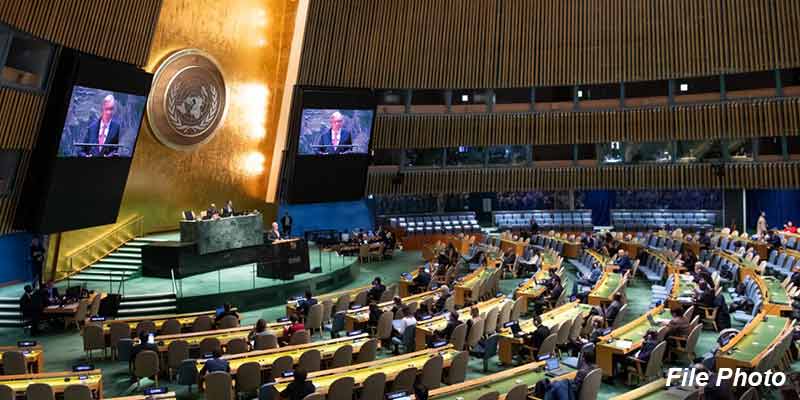- World
- Sep 11
Palestine takes seat among UN Member States at 79th General Assembly Session
• The 79th Session of the UN General Assembly opened on September 10 in New York.
• Incoming President Philemon Yang outlined a vision of unity in diversity and called for deeper international cooperation to tackle a host of global challenges, including climate change, escalating conflict, and a slowdown in sustainable development.
• Palestine was given a seat in the General Assembly Hall next to the UN member states. Palestine is not a full member state of the 193 member United Nations.
• The opening of the 79th Session also marked the first time the State of Palestine was seated among Member States at the General Assembly, following the adoption of resolution at the tenth emergency special session earlier this year.
• India had voted in favour of the draft resolution that said Palestine is qualified and should be admitted as a full member of the UN.
• That resolution also set forth additional rights for the State of Palestine’s participation in Assembly meetings, but not the right to vote or put forward its candidature to UN Main Organs such as the Security Council or the Economic and Social Council (ECOSOC).
• The additional rights and privileges do not confer membership to the State of Palestine, which requires a specific recommendation from the Security Council (UNSC).
UN General Assembly (UNGA)
• The General Assembly is the UN’s most representative body, comprising all 193 Member States.
• Established in 1945 under the Charter of the United Nations, the General Assembly is the main policy-making organ of the Organisation.
• It provides a unique forum for multilateral discussion of the full spectrum of international issues covered by the Charter.
• It also plays a central role in the process of standard-setting and the codification of international law.
• The Assembly meets from September to December each year (main part), and thereafter, from January to September (resumed part), as required.
• In addition to its regular sessions, the Assembly may meet in special and emergency special sessions.
• Each of the 193 Member States in the Assembly has one vote. Votes taken on designated important issues – such as recommendations on peace and security, the election of Security Council and Economic and Social Council members, and budgetary questions – require a two-thirds majority of Member States, but other questions are decided by a simple majority.
Functions and powers of the General Assembly:
According to the Charter of the United Nations, the General Assembly may:
• Consider and approve the United Nations budget and establish the financial assessments of Member States.
• Elect the non-permanent members of the Security Council and the members of other United Nations councils and organs and, on the recommendation of the Security Council, appoint the Secretary-General.
• Consider and make recommendations on the general principles of cooperation for maintaining international peace and security, including disarmament.
• Discuss any question relating to international peace and security and, except where a dispute or situation is currently being discussed by the Security Council, make recommendations on it.
• Discuss, with the same exception, and make recommendations on any questions within the scope of the Charter or affecting the powers and functions of any organ of the United Nations.
• Initiate studies and make recommendations to promote international political cooperation, the development and codification of international law, the realisation of human rights and fundamental freedoms, and international collaboration in the economic, social, humanitarian, cultural, educational and health fields.
• Make recommendations for the peaceful settlement of any situation that might impair friendly relations among countries.
• Consider reports from the Security Council and other United Nations organs.
Manorama Yearbook app is now available on Google Play Store and iOS App Store

